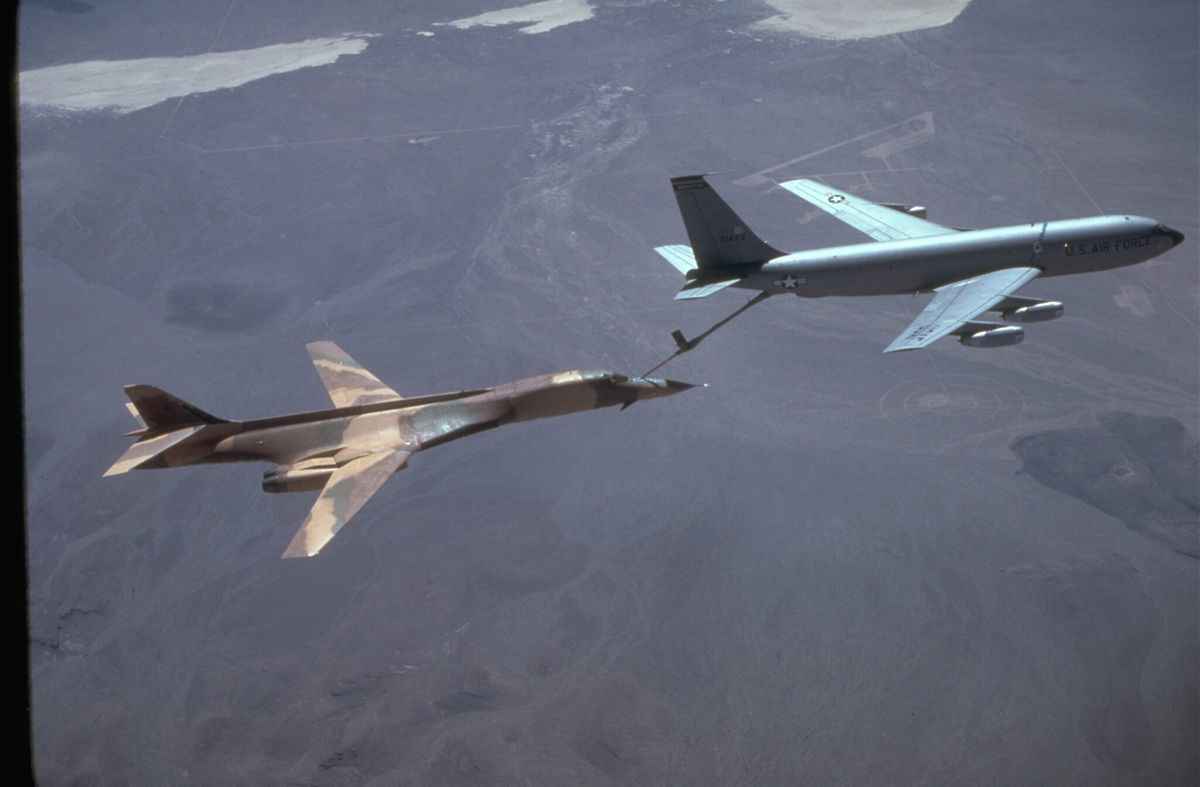SUBSCRIBER+EXCLUSIVE – Last week’s retaliatory strikes by the U.S. for the killing of three American military service members in Jordan last weekend, lasted only 30 minutes in what the Pentagon says is the beginning of a multi-tiered response.
The U.S. military dropped more than 120 bombs on more than 80 targets in Iraq and Syria, in a mission that included B-1 bombers flying from the U.S., instead of flying from bases in the region.
The strikes reportedly damaged key infrastructure used by Iran’s Revolutionary Guard Corps (IRGC) and the militia groups they support, including the organization that claimed responsibility for the January 28 attack that killed the soldiers in Jordan.
It’s too early for a full assessment of the damage done or to understand whether the mission of deterring future attacks against U.S. forces will be accomplished.
THE CONTEXT
- Reports from the region say at least 40 people were killed in the strikes, with conflicting reports on the numbers of militants and civilians dead
- The Syrian, Iraqi and Iranian governments have all condemned the attacks, but - critically - there has been no vow of reprisal from Tehran.
- Iran’s foreign ministry spokesman said Saturday that the bombings were “an adventurous action and another strategic mistake” by the U.S. but stopped short of threatening another round of retaliation.
Friday’s half-hour bombing barrage also drew a range of responses from Cipher Brief experts. We asked for their overall reactions, their views on the wisdom of avoiding attacks on Iranian soil, the likelihood of an Iranian response, and thoughts on what we should expect in the days and weeks to come. (Spoiler alert: they don’t agree on many of the answers).
General Philip Breedlove (Ret.), Former Supreme Allied Commander, NATO
Gen. Breedlove served in several senior staff positions to include; Vice Chief of Staff of the U.S. Air Force, Senior Military Assistant to the Secretary of the Air Force; and Vice Director for Strategic Plans and Policy on the Joint Staff.
General Jack Keane (Ret.), Former Vice Chief of Staff, U.S. Army
General Keane, a four-star general, retired after 37 years of service which culminated in his appointment as acting Chief of Staff and Vice Chief of Staff of the US Army. He is a regular contributor at FOX News.
John McLaughlin, Former Acting Director, CIA
John E. McLaughlin is the Distinguished Practitioner in Residence at the Johns Hopkins School of Advanced International Studies (SAIS). He is a former Acting Director of Central Intelligence and former Deputy Director of Central Intelligence.
Norm Roule, Former National Intelligence Manager for Iran, ODNI
As NIM-I, Roule was the principal Intelligence Community (IC) official responsible for overseeing all aspects of national intelligence policy and activities related to Iran, to include IC engagement on Iran issues with senior policymakers.
Ralph Goff, Former Senior CIA Officer
Ralph Goff was a 6-time “Chief of Station” with extensive service in Europe, the Middle East, and Central and South Asia including several war zones. He served as Chief of Operations for Europe and Eurasia.
Glenn Corn, Former Senior CIA Officer
Glenn Corn worked for 34 years in the U.S. Intelligence, Defense, and Foreign Affairs communities. He spent over 17 years serving overseas and served as the U.S. President’s Senior Representative on Intelligence and Security issues.
Assessing The Strikes
General Philip Breedlove (Ret.): They've used a fairly large number of different weapons platforms including the B-1, which brings a very robust attack capability. But my first impression, is that we're late. We should've done this days ago.
John McLaughlin: What’s impressive here is the volume and diversity of the instruments used by the U.S., particularly the deployment of the B-1 bomber, which can put 16 2000-pound bombs on 16 separate targets with laser-like precision. It’s probably more than Iran was expecting.
Ralph Goff: This was a message to Tehran saying, "Okay, we could have hit you back just using what we have in the region, but we flew B-1 bombers from the United States because this time we're bombing targets outside Iran. If you push us too hard, these same capabilities will be used against you inside Iran." So, I think it was good messaging by the administration there.
General Jack Keane (Ret.) (speaking on FOX News): We're in the very early stages of this. I applaud the administration… This is going to go on for days [as they] conduct a sustained air campaign. That's the right thing to do. Let's see what actually happens as a result of it.
Glenn Corn: The administration was under a lot of pressure to respond domestically and internationally, but they wanted to look for a response that was calculated to send a message but not push Iran to cross a red line, because they're looking not to escalate. There's some hope now in Gaza that the Israelis and Hamas are working on a ceasefire agreement. The administration probably does not want to undermine that.
Unfortunately, I think it may be effective tactically, but I think in the long run it's not going to be effective. It may give us a little pause and hopefully it'll help get us to a ceasefire between Israel and Hamas. But I long-term, we're going to have the same problem for a long time.
Avoiding Strikes Against Iran
Gen. Breedlove (Ret.): What is clear is that they have not hit inside Iran. What is also clear is that, if we're going to message Iran, we need to hit things that they hold dear. That doesn't necessarily have to be inside Iran. If we want to talk about proportionality of targets, then the Iranian surveillance ship that's been steaming around in the area providing targeting details to all of these militias, that's fair game.
Norman Roule: It's easy to say that we should strike all of Iran's capabilities in the area, and that includes its personnel and its locations. That's easy to say, but you raise issues such as if the United States starts attacking the ships of a sovereign country in international waters, that sets interesting precedents. We certainly have causes and reasons to do that, but other people may think they have causes and reasons to do that, too, and that is getting into active war territory.
I think the United States will want to be careful about transforming the Arabian Sea, the Gulf of Aden, the Gulf of Oman - which are vast bodies of water - into a less predictable zone for trade and transportation without some serious strategic gain by its operations.
We're watching the B-1 be employed, we have a submarine in the area, we have a number of highly sophisticated, extraordinarily capable pieces of equipment for which Iran and its proxies have no defense or capacity to operate against. That is a message in itself. It's also a message to our partners in the region.
Will Iran Retaliate?
McLaughlin: Iran will retaliate in some way. This chessboard never freezes after the latest move. But I would not expect it to be massive. I do think the Ayatollah wants to avoid a direct war with the United States and will not want to bring that possibility closer.
Gen. Breedlove (Ret.): We don't believe Iran has fired any missiles from their soil at our forces, but they have the capability of doing that. And there are other very lucrative targets, as you know, around the Red Sea and all the way around Saudi Arabia that Iran could strike and cause major problems for the oil flow and oil infrastructure, and all of these are consequential. These are things that our leaders are going to have to think about.
Roule: The Iranian response is most likely to be rhetorical. We should expect Iranian officials to bolster their air defenses and to make a number of bellicose statements regarding their posture, toward their proxies in the region. But Iran right now is certainly in a wait and see moment.
What I would focus on is that Iran operates on a very broad canvas, and we should absolutely pull [U.S. forces] from the Iraq area of operations and consider how Iran may use the Yemenis or the Lebanese Hezbollah or other actors. These other actors are going to be wondering: are they next on the hit list from the United States? So, they're likely not to involve themselves directly until they better understand the threat against them. But Iran's going to need to show regional defiance, capability, and to show that the United States can't tamp down all the proxies with one action.
Goff: The United States and Israel and our allies are pulling out all the stops to try and figure out, what the discussions are in Iran because this is the key here. And this messaging, by showing a little leniency, if you will, against the IRGC commanders involved here, will Tehran view that as a sign of weakness? Or, given that that was followed quickly by a message of B-1 bombers, will they come to a sensible conclusion and say, "Okay, the White House here is looking to de-escalate. Since we really don't want to a war either, we Iranians, maybe we should follow suit and de-escalate as well." So there is a glimmer of hope in that, I think.
A Wider War?
Gen. Breedlove (Ret.): The administration will have some tough decisions to make, but if we think back to Ukraine, if we think back to the start of the war in Ukraine, what we have seen there is an overabundance of caution when it comes to sparking a wider war, and that overabundance of caution may have taken key opportunities off of the list of things that we might do.
Gen. Keane (Ret.) (on FOX News): We're not expanding the war. Iran expanded the war through its proxies against Northern Israel. 80,000 Israelis displaced. Then the Houthi campaign, disrupting 50% of the traffic through the Suez Canal and the Red Sea. That's an expansion of the war by Iran and the Houthis. And with the other proxies, we should've been pounding them to prevent eventual loss of life as opposed to doing something after the loss of life.
What Comes Next?
Gen. Breedlove (Ret.): We talk often about proportional response. I'm sure the SOCOM [Special Operations Command] commander has given the president a robust list, from the same things we've hit in the past all the way up to hitting very consequential targets. And now it is up to the president what he chooses to do.
There are proportional targets, like I mentioned before, this ship that Iran has been sailing around in the midst of this - it’s what we call an ISR, an Intelligence, Surveillance and Reconnaissance platform, and it has been, without a doubt, a big part of how these proxies are targeting America. So why don't we make a fishing reef out of that ship?
Roule: This is going to take a while to play out. We are probably going to end up hitting well north of 125 to 150 sites. It's going to take time. You're going to want to look at the day-after intelligence assessments to see what the bomb damage is, who's moving in the area and what actors are responding.
I would also look for compounds that house key individuals, compounds that house sensitive equipment that isn't necessarily stored at a traditional weapons depot, intelligence coordination, and fusion centers set up between the revolutionary guard and its operative amongst the various militias. Iran is a long way off and its proxies are going to see it's not able to do much to protect them in coming days.
Goff: I’ve seen reporting that indicates that the Kurds in Syria have been warning that Iraqi-backed militia commanders who are high-value targets and Iranian IRGC commanders who feel that they would be targeted by us have gone into hiding, so they're kind of absent from their posts. And the Kurds are warning that ISIS, which has never gone away, is going to take advantage of this. They've put out the warnings, saying watch for ISIS to try and take advantage and launch their own strikes against various targets in the region.
Corn: With the Kurds, I think they're probably very concerned right now that there's talk about withdrawing U.S. troops from Iraq and Syria and ending that mission. So, definitely, the ISIS threat is there, and I'm sure that the Kurds are trying to remind Washington that if you leave too soon, that is a big threat.
Tom Nagorski, Brad Christian and Suzanne Kelly contributed to this report.
Who’s Reading this? More than 500K of the most influential national security experts in the world. Have deep-experience in national security and something to say? Drop us a note at info@thecipherbrief.com.
Read more expert-driven national security insights, perspective and analysis in The Cipher Brief



















